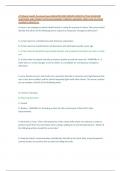Exam (elaborations)
ATI Mental Health Proctored Exam NEW VERSION UPDATE ACTUAL EXAM 400 QUESTIONS AND CORRECT DETAILED ANSWERS (VERIFIED ANSWERS) 100% PASS SOLUTION /ALREADY GRADED A+
- Course
- Institution
ATI Mental Health Proctored Exam NEW VERSION UPDATE ACTUAL EXAM 400 QUESTIONS AND CORRECT DETAILED ANSWERS (VERIFIED ANSWERS) 100% PASS SOLUTION /ALREADY GRADED A+
[Show more]



